New project aims to tackle transport-related exclusion for young people

The Centre for Transport and Society at UWE Bristol has teamed up with walking and cycling charity, Sustrans, to launch a new research project which aims to address transport-related barriers faced by young people aged 12-24 years in the UK.
The project, titled Transport to Thrive, will explore why transport is important to young people’s ability to reach opportunities they need to become thriving and healthy adults, whilst highlighting the issues they face. The project will identify and examine the effectiveness of a selection of policy and practice solutions in supporting young people to reach opportunities.
Running until August 2023, the project will produce insights and outputs that are useful for supporting policy and industry action. It will bring together an interest group of policy and industry stakeholders that are committed to tackling the transport-related barriers that young people face.
A panel of young volunteers will also be recruited to share their experiences and to guide project priorities
Sarah Collings, Senior Research Fellow in Transport and Young People at UWE Bristol, said: “Young people have specific needs from a transport system. Many young people have less disposable income and are more likely to rely on public transport than other age groups.
It is also a time in life to access education, training, apprenticeships and first jobs. However, not all of these places are well-served by transport options that are available to young people.”
She added: “We should not accept a transport system that does not meet the needs of our young population. Action to address transport exclusion for young people will help to safeguard their futures.
“The pandemic has added to issues of exclusion for young people. We have seen a fall in employment prospects, an interruption to education and social activities, and a decline in mental health. If we are serious about supporting young people to recover from the pandemic, we need to identify, and account for, the impacts of transport decisions on the young cohort.”
Transport to Thrive contributes to this. Through the project the team, led by Dr. Kiron Chatterjee, will identify and evaluate schemes that support inclusion for young people.
Ultimately, the project group would like to see a country in which transport decisions and investment are based on equitable access options for mobility for all age groups and within the diverse cohort of young people.
They will work towards this vision by improving understanding on how transport and transport decisions impact on a diverse cohort of young people; by raising awareness of these issues; and by bringing together community of decision-makers and young people interested in tackling the barriers that young people face.
Andy Cope, Director of Evidence and Insight at Sustrans, said: “Few young people have access to a car, so walking and cycling can have an important role to play in helping younger people to access opportunity.
However, too few young people are choosing to walk or cycle, partly due to poor facilities and partly due to not developing skills and capabilities. This also represents a risk factor for current and future physical health and mental wellbeing.”
He added: “We have seen how the pandemic has had a disproportionate economic effect on young people. Getting the transport system right for young people is vital in starting to redress the balance.
Through Transport to Thrive, we hope to understand how our planning systems, and in particular cycling and walking infrastructure, can support younger people to reach the places that they want to go”.
Transport to Thrive is funded as part of the Health Foundation’s Young People’s Future Health Enquiry Inquiry. The inquiry found that, for young people from across the UK, transport is a barrier for reaching opportunities pivotal to their life chances.
It follows a report released by Sustrans and The Centre for Transport and Society under the inquiry, outlining seven policy and research recommendations on how transport can affect young people’s development and future prospects.
Martina Kane, Policy and Engagement Manager at the Health Foundation said: “Between the ages 12 and 24 is a crucial time for young people as they build the foundations for a healthy adulthood. We are funding Transport to Thrive as our Young People’s Future Health Inquiry identified the important role that transport plays in building the foundations of a healthy future.
“Reliable, affordable transport allows young people to access good quality work, to live in secure and affordable housing and forge strong relationships with their friends, families and communities. As policy makers look towards a recovery from the COVID-19 pandemic, young people’s long-term health needs to be at the heart of their decision making.”
Related news

15 December 2025
UWE Bristol rises eleven places in People & Planet University League
UWE Bristol has risen to 14th in the People & Planet University League (UK), a jump of eleven places.

12 December 2025
UWE Bristol’s environmentally conscious and student-focused accommodation wins three awards
Purdown View, the world's largest certified Passivhaus student accommodation development, has been recognised at Property Week Student Accommodation Awards.

20 November 2025
UWE Bristol ranked among top 12 per cent of universities globally for sustainability
UWE Bristol has climbed over 400 places in the QS World University Sustainability Rankings 2026, which evaluates universities on a range of environmental and social impacts.

06 November 2025
UWE Bristol welcomes West of England Mayor for annual Green Week
Helen Godwin, Mayor of the West of England, visited UWE Bristol during its annual Green Week to see the sustainability-driven research, innovation and skills initiatives that are helping to power the growth of the region’s green economy.
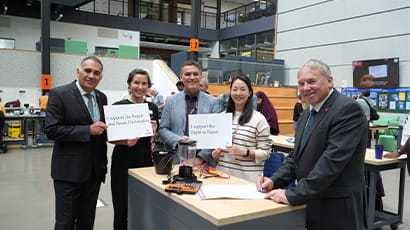
16 October 2025
UWE Bristol signs Repair and Reuse Declaration in commitment to sustainable initiatives
UWE Bristol is the first UK university to sign the Repair and Reuse Declaration as a whole institution, a call to legislators and decision makers to tackle climate change through greater repair and reuse support.

15 October 2025
UK food needs radical transformation on scale not seen since Second World War, new report finds
A new report from the Agri-Food for Net Zero Network+ finds urgent action on food is needed if the UK is to reboot its flagging economy, save the NHS billions, ensure national food security, and meet climate commitments.
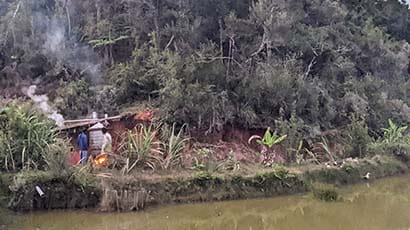
24 September 2025
UWE Bristol to help protect threatened forest in Madagascar in £800k project
UWE Bristol is a partner in a groundbreaking project awarded almost £800,000 in funding to protect one of Madagascar’s most precious and threatened forests.
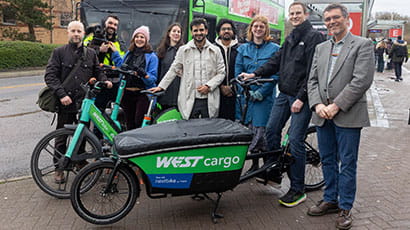
24 February 2025
WESTbusStop+ makes sustainable travel more convenient
A new WESTbusStop+ bringing together buses and other ways to travel has been officially opened at UWE Bristol’s Frenchay campus.
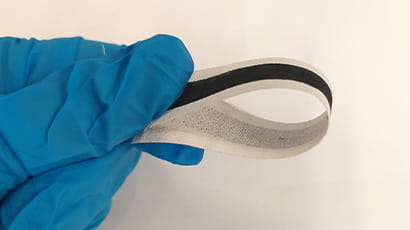
03 January 2025
Big leap forward for environmentally friendly ‘e-textiles’ technology
Research led by UWE Bristol and the University of Southampton has shown wearable electronic textiles (e-textiles) can be both sustainable and biodegradable.

28 November 2024
Work of UWE Bristol academics features in Government report on air quality measurement
Two UWE Bristol academics have made contributions to an influential Government report on the measurement of air pollution.
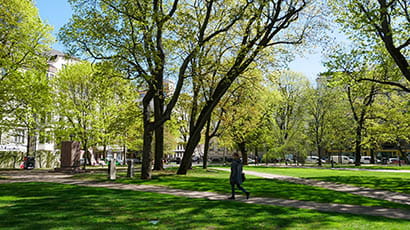
27 November 2024
Traffic noise reduces the stress-relieving benefits of listening to nature, study finds
Road traffic noise reduces the wellbeing benefits associated with spending time listening to nature, researchers have discovered.

15 November 2024
Grasslands project led by UWE Bristol academic to support UK’s bid for net zero emissions
A UWE Bristol researcher will lead a £4.7 million project focused on the management of UK’s grasslands aimed at supporting efforts to achieve net zero emissions by 2050.






